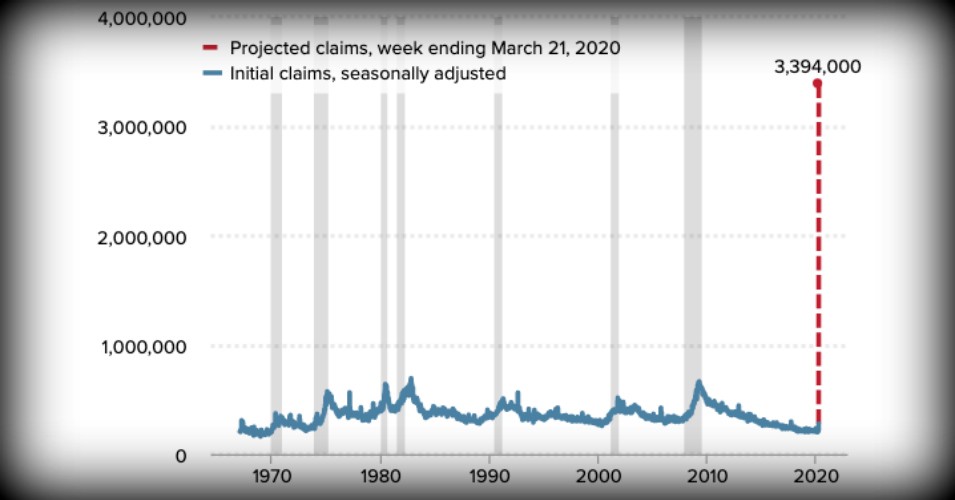A new analysis released Tuesday shows that more U.S. workers filed unemployment claims last week than during any other week in the nation’s history.
An estimated 3.4 million Americans filed such claims for the week ending March 21, according to the findings from the Economic Policy Institute (EPI).
“This will dwarf every other week in history,” wrote EPI’s Aaron Sojourner and Paul Goldsmith-Pinkham, adding, “The true impacts are undoubtedly of larger scale than described here.”
NORAD Launches US Fighter Jets as Russian Military Aircraft Enter American Air Defense Identification Zone
Virginia Dems mandate Jan. 6 be taught as ‘violent insurrection,’ ban election fraud claims in schools
Trump Turns Up Heat on Republicans, Pressures Them to Pass SAVE Act: ‘Country Defining Fight for the Soul of Our Nation!’
Pentagon policy chief grilled as Dem claims Trump broke promise about going to war with Iran
Georgia sheriff arrested on DUI charge after blood alcohol content was allegedly almost triple legal limit
Small plane crashes into Phoenix home minutes after takeoff, injuring 3
‘Third-party’ auditor investigating Minnesota fraud received millions in state Medicaid funds
Macron vows nuclear arsenal boost as Europe turns to nukes amid rising global threats
‘Under siege’: Inside the growing radical Islam threat critics say is hiding in plain sight in deep red Texas
Walz-Ellison administration ‘enabled’ Minnesota’s fraud scandal: Guy Benson
NYC Dept of Education employee arrested, charged with murder of Bronx father
Savannah Guthrie returns to ‘Today’ show studio for first time since mother went missing
Iran widens regional war with first strike into Azerbaijan
5 House Oversight Committee Republicans Join with Democrats to Subpoena Pam Bondi in Epstein Probe
As Jasmine Crockett Concedes Texas Senate Primary, Attention Focuses on Radical Dem Who Beat Her
The startling calculation—based on claims in 35 states and Washington, D.C. and extrapolated to the other 15 states—comes as the nation continues to experience a rise in cases of the novel coronavirus—with over 46,000 confirmed as of Tuesday—and as ordinary Americans feel the economic and societal impacts of the crisis, with schools, stores, and work places temporarily shuttered, varying degrees of lockdowns in place, and households and frontline workers still wondering if lawmakers will put their urgent needs above those of corporate America.
A graph accompanying the new EPI analysis, which is based on data from news reports from March 15 to March 21, illustrates the enormous jump in unemployment claims—even if the actual figure ends up being on the analysts’ low-end projection of 3 million claims. At no other point in the timeline shown does the figure even scrape 1 million.

Reaction to the findings was stark:
NORAD Launches US Fighter Jets as Russian Military Aircraft Enter American Air Defense Identification Zone
Virginia Dems mandate Jan. 6 be taught as ‘violent insurrection,’ ban election fraud claims in schools
Trump Turns Up Heat on Republicans, Pressures Them to Pass SAVE Act: ‘Country Defining Fight for the Soul of Our Nation!’
Pentagon policy chief grilled as Dem claims Trump broke promise about going to war with Iran
Georgia sheriff arrested on DUI charge after blood alcohol content was allegedly almost triple legal limit
Small plane crashes into Phoenix home minutes after takeoff, injuring 3
‘Third-party’ auditor investigating Minnesota fraud received millions in state Medicaid funds
Macron vows nuclear arsenal boost as Europe turns to nukes amid rising global threats
‘Under siege’: Inside the growing radical Islam threat critics say is hiding in plain sight in deep red Texas
Walz-Ellison administration ‘enabled’ Minnesota’s fraud scandal: Guy Benson
NYC Dept of Education employee arrested, charged with murder of Bronx father
Savannah Guthrie returns to ‘Today’ show studio for first time since mother went missing
Iran widens regional war with first strike into Azerbaijan
5 House Oversight Committee Republicans Join with Democrats to Subpoena Pam Bondi in Epstein Probe
As Jasmine Crockett Concedes Texas Senate Primary, Attention Focuses on Radical Dem Who Beat Her
This chart, holy shit https://t.co/luqjZ4ngsh pic.twitter.com/NeCbcOY1aw
— Christopher Ingraham (@_cingraham) March 24, 2020
Sojourner and Goldsmith-Pinkham, both research associates at EPI, put the projection into the context of the nation’s unemployment rate:
For scale, consider that 3.4 million Americans moving from employment to unemployment would raise the number of the unemployed from 5.7 million to 9.1 million. This alone would raise the unemployment rate by more than half, by 2 percentage points from 3.5% to 5.5%, moving back to 2015 levels in just one week. This spike represents 2.2% of all jobs in the economy. The largest monthly rise in the unemployment rate in American history was plus 1.3 percentage points in October 1949.
NORAD Launches US Fighter Jets as Russian Military Aircraft Enter American Air Defense Identification Zone
Virginia Dems mandate Jan. 6 be taught as ‘violent insurrection,’ ban election fraud claims in schools
Trump Turns Up Heat on Republicans, Pressures Them to Pass SAVE Act: ‘Country Defining Fight for the Soul of Our Nation!’
Pentagon policy chief grilled as Dem claims Trump broke promise about going to war with Iran
Georgia sheriff arrested on DUI charge after blood alcohol content was allegedly almost triple legal limit
Small plane crashes into Phoenix home minutes after takeoff, injuring 3
‘Third-party’ auditor investigating Minnesota fraud received millions in state Medicaid funds
Macron vows nuclear arsenal boost as Europe turns to nukes amid rising global threats
‘Under siege’: Inside the growing radical Islam threat critics say is hiding in plain sight in deep red Texas
Walz-Ellison administration ‘enabled’ Minnesota’s fraud scandal: Guy Benson
NYC Dept of Education employee arrested, charged with murder of Bronx father
Savannah Guthrie returns to ‘Today’ show studio for first time since mother went missing
Iran widens regional war with first strike into Azerbaijan
5 House Oversight Committee Republicans Join with Democrats to Subpoena Pam Bondi in Epstein Probe
As Jasmine Crockett Concedes Texas Senate Primary, Attention Focuses on Radical Dem Who Beat Her
Grim as the scenario painted by the analsis is, reality may be even worse. The researchers wrote that the actual tally of claims “could be substantially higher.” Not all unemployed workers are able to file unemployment insurance claims either, and for those that do, they’ll get about half—or less—of their regular income. The end of the coronavirus crisis is also not in the immediate future.
All that points to the need for the federal government to provide states with more aid.
“American working families are paying a large price through no fault of their own,” wrote Sojourner and Goldsmith-Pinkham. “But there is no shortcutting public health to get the American economy back to work. A healthy economy requires public health.”
Story cited here.
























